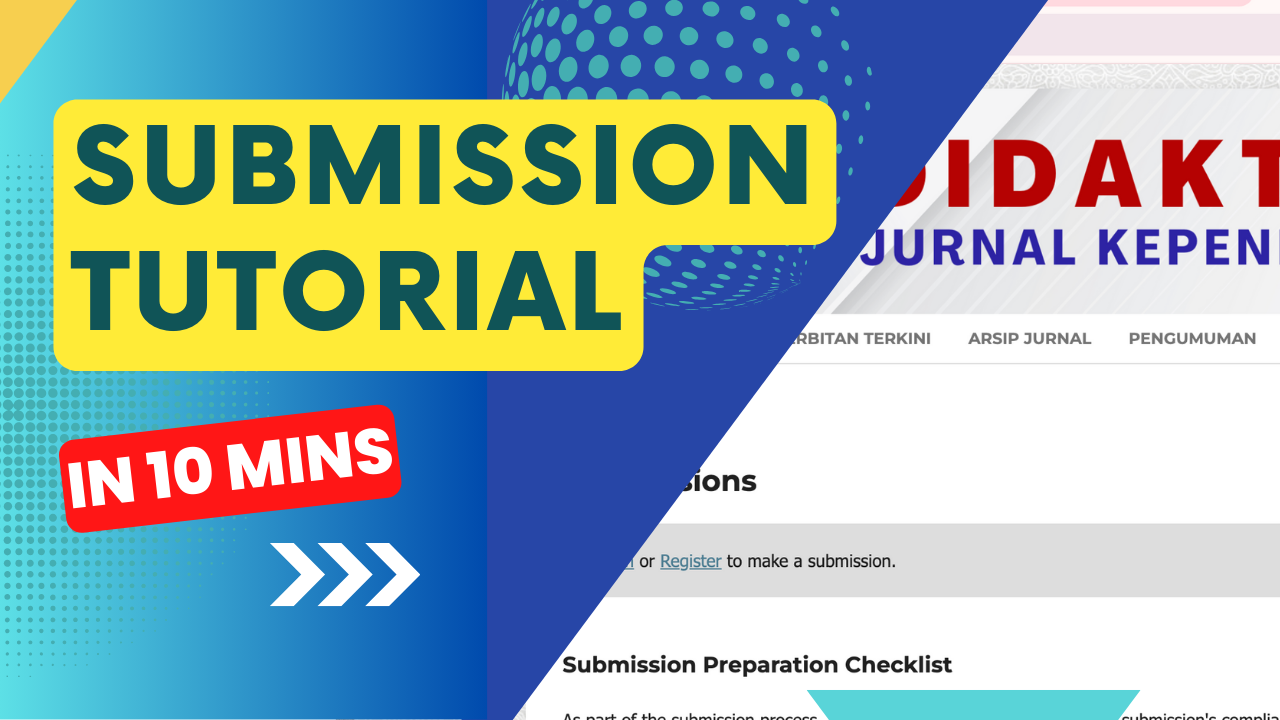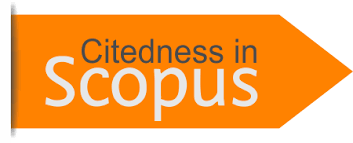The Relationship between Student Perceptions of Teaching Style and Teachers' Emotional Intelligence and Motivation Learn PAI class XI MAS Al Imron
Abstract
This research aims to determine whether there is a relationship between students' perceptions of the teacher's teaching style and students' PAI learning motivation and whether there is a relationship between the teacher's emotional intelligence and students' PAI learning motivation and whether there is a joint relationship between students' perceptions of teaching styles and emotional intelligence. teachers with motivation to learn PAI. This type of research is quantitative descriptive correlational. The sample was taken from 20% of the 180 population in all class XI, representing 36 students. The data collection tool uses a questionnaire in the form of a Likert scale. The results of the research show that students' perceptions of teachers' teaching styles and teachers' emotional intelligence have a relationship with students' learning motivation in Grade 11 Islamic Religious Education among MAS AL IMRON students, Kec. Ujung Batu, North Padang Lawas Regency. In testing the research hypothesis, the correlation obtained (1) (2) correlation of X2 with Y = calculated r value is greater than table r value (0.996>0.329) and siqnification value is smaller than 0.05 (0.016<0.05). (3) The correlation of X1 and This is also shown by the correlation value or R of 0.996 which is greater than the r table (0.996>0.329). This means that the results of data analysis show a relationship between the three variables with a significant level of 95%
Metrics
References
Akmalia, R. (2021). Intensity of Achievement Motivation Through Online Learning. Pioneers: Journal of Education , 10 (3), 1–11. https://doi.org/10.22373/pjp.v10i3.12174
Akmalia, R., Nst, WN, & Siahaan, A. (2023). Influence of Self-Efficacy, Organizational Culture, and Job Satisfaction on the Performance of Madrasah Aliyah Teachers. Nidhomul Haq: Journal of Islamic Education Management , 8 (3), 437–453. https://doi.org/https://doi.org/10.31538/ndh.v8i3.4091
Amidi, & Zahid, MZ (2016). Building Mathematical Creative Thinking Abilities Using Problem-Based Learning Models Assisted by E-Learning. Proceedings of the National Mathematics Seminar , 586–594.
Andreyeni, R., Har, E., & Sari, RT (2020). STUDY HABITS AND LEARNING STYLES AND CONTRIBUTION TO BIOLOGY LEARNING OUTCOMES OF CLASS JOURNAL OF THE FACULTY OF TEACHER AND EDUCATIONAL SCIENCES , 8 (2), 17–18.
Arikunto, S. (2016). Research Procedures A Practical Approach . Jakarta: Rineka Cipta.
Baehaqi, ML, & Murdiono, M. (2020). Strengthening Discipline Character of Students at Muhammadiyah Boarding-School (MBS) Muhiba Yogyakarta. Dynamics of Science , 20 (1), 63–82. https://doi.org/10.21093/di.v20i1.1671
Harisuddin, MI (2019). A Bit of the Essence of Creative Thinking & Student Learning Motivation . Pantera Publishing.
Hidayati, S., Rahmi, W., & Yasri, A. (2022). Teacher Behavior Patterns in Improving Student Character Education at SMAN 8 MEDAN. Journal of Religious Information, Management and Strategy: Journal of Islamic Education Management (IKaMaS) , 2 (2), 104–108. Retrieved from https://ikamas.org/jurnal/index.php/ikamas/article/view/28
Khairani, U. (2019). The Relationship between Learning Style and Emotional Intelligence with the Ability to Memorize the Al-Quran of Class X MAN 2 Medan Model Students . North Sumatra State Islamic University.
Kristiawan, M., & Rahmat, N. (2018). Increasing Teacher Professionalism Through Learning Innovation. Iqra' Journal: Educational Science Review , 3 (2). https://doi.org/https://doi.org/10.25217/ji.v3i2.348
Lestari, P. (2018). The influence of the kinesthetic learning style on the learning outcomes of class VIII students in Fiqh subjects at MTS Negeri 2 Malang City . Maulana Malik Ibrahim State Islamic University.
Nurhasanah, S., & Sobandi, A. (2016). Interest in Learning as a Determinant of Student Learning Outcomes. Journal of Office Management Education , 1 (1), 128. https://doi.org/10.17509/jpm.v1i1.3264
Samseptiany, I., Baedowi, S., & Arisyanto, P. (2022). The Influence of Teachers' Emotional Intelligence on Learning and Attitude Development of Children with Special Needs. DWIJALOKA Journal of Primary and Secondary Education , 3 (4), 479–486. https://doi.org/https://doi.org/10.35473/dwijaloka.v3i4.2019
Saptono, A. (2016). The influence of teacher creativity in learning and students' emotional intelligence on economics learning achievement in class X students at Sma Negeri 89 Jakarta. Scientific Journal of Ecoscience , 14 (1), 105–112. https://doi.org/https://doi.org/10.21009/econosains.0141.08
Sigala, L. (2016). The relationship between students' perceptions of how teachers teach and the learning motivation of students who have attended remedial training. Psychoborneo: Scientific Journal of Psychology , 4 (3). https://doi.org/http://dx.doi.org/10.30872/psikoborneo.v4i3.4088
Surya, H. (2018). Who Says Being a Human Learner is Difficult? Jakarta: Hendra Surya.
Tirtayadi, A., Yulina, Y., & Sudirman, AHMAD (2017). The Relationship between Learning Motivation and Student Perceptions of Teacher Pedagogical Competence with Learning Achievement. Pedagogy: Journal of Elementary Education , 5 (17).
Zakiyyah, D., Suswandari, M., & Khayati, N. (2022). Application of Ice Breaking in the Learning Process to Increase Learning Motivation for Class IV Students at SD Negeri Sugihan 03. Journal of Educational Learning and Innovation (ELIa) , 2 (1), 73–85. https://doi.org/https://doi.org/10.46229/elia.v2i1.333
Zuliamiranti, WN, & Fauziah, RSP (2017). The Influence of Teacher Social Competence on Teaching and Learning Interactions. Tadbir Muwahhid , 1 (1), 81. https://doi.org/10.30997/jtm.v1i1.842
Copyright (c) 2024 Julkasi Ady Sahala Matondang, Yusnaili Budianti, Muhammad Rifai

This work is licensed under a Creative Commons Attribution 4.0 International License.
Dengan mengirimkan naskah artikel, berarti penulis setuju dengan segala kebijakan yang ditetapkan oleh jurnal dan penerbit.
Penulis menyatakan bahwa:
- kebijakan ini telah diketahui dan disetujui bersama oleh semua penulis;
- naskah artikel belum dipublikasikan secara resmi sebelumnya di media ber-ISSN atau ber-ISBN yang terdaftar, kecuali dalam bentuk abstrak atau sebagai bagian dari materi kuliah, atau skripsi/tesis/disertasi yang tidak diterbitkan;
- naskah tidak sedang dalam proses editorial dan dipertimbangkan untuk publikasi di tempat lain;
- publikasi naskah ini telah disetujui oleh semua penulis, institusi afiliasi penulis, otoritas yang bertanggung jawab, dan lembaga di mana kegiatan telah dilakukan;
- naskah berisi materi yang aman dari pelanggaran hak cipta;
Perjanjian Hak Cipta dan Lisensi
- Penulis memiliki hak cipta dan hak kepemilikan lainnya yang terkait dengan artikel.
- Penulis memiliki hak dan diizinkan untuk menggunakan substansi artikel untuk karya-karya penulis berikutnya, termasuk untuk keperluan bahan/materi kuliah dan buku.
- Penulis menyerahkan hak publikasi pertama kepada jurnal dengan di bawah Lisensi Creative Commons (CC BY 4.0).
Pernyataan Lisensi CC BY 4.0
Anda diperbolehkan:
- Berbagi — menyalin dan menyebarluaskan kembali materi ini dalam bentuk atau format apapun;
- Adaptasi — menggubah, mengubah, dan membuat turunan dari materi ini untuk kepentingan apapun, termasuk kepentingan komersial.
Pemberi lisensi tidak dapat mencabut ketentuan di atas sepanjang Anda mematuhi ketentuan lisensi berikut ini.
- Atribusi — Anda harus mencantumkan nama yang sesuai, mencantumkan tautan terhadap lisensi, dan menyatakan bahwa telah ada perubahan yang dilakukan. Anda dapat melakukan hal ini dengan cara yang sesuai, namun tidak mengisyaratkan bahwa pemberi lisensi mendukung Anda atau penggunaan Anda.
- Tidak ada pembatasan tambahan — Anda tidak dapat menggunakan ketentuan hukum atau sarana kontrol teknologi yang secara hukum membatasi orang lain untuk melakukan hal-hal yang diizinkan lisensi ini.






.png)








